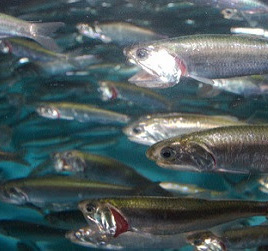Most invertebrates can detect polarization of light in addition to color and intensity, which helps with target detection, orientation and communication. But a recent study found evidence of the first vertebrate that possesses polarization vision: the northern anchovy. Optic nerve recordings from anchovies have shown that the fish’s eyes show retinal segregation for independent colour […]
Tag: fish
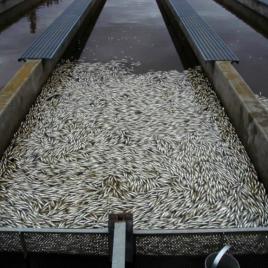
How a deadly virus spreads among young farmed fish in the Pacific Northwest
A new study explores the spread of infectious hematopoietic necrosis virus (IHNV), which plagues Pacific salmon and trout. Researchers looked at the spread of IHNV among juvenile hatchery-raised fish in the Pacific Northwest, where rates of infection and mortality are high. Hatchery-raised salmon present a unique challenge when it comes to IHNV detection, because while hatcheries […]
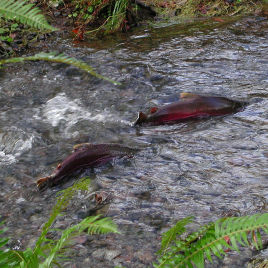
Salmon like the dark side
Salmon living in tanks with darker backgrounds are typically less aggressive than those living in a lighter coloured environment, according to new research. The researchers divided 100 Coho Salmon into 10 different tanks, each with different colour patterns, and monitored their behaviour. They found that the salmon prefered the darker areas, and were less aggressive […]
Recovery is possible for global fisheries
The world’s declining fisheries could recover in less than a decade if management reforms are implemented in time, according to researchers. Researchers looked at 4,500 fisheries in the world, representing about 78 per cent of the reported global catch using state of the art bio-economic models. The researchers found that while the majority of fisheries […]
Overlapping fishing zones could be placing strain on oceanic sharks
Overlap in the ranges of sharks and fishing vessels is placing oceanic shark species at risk from overfishing say researchers. By monitoring the ranges of eight species of oceanic sharks by satellite, and tracking two fleets of longline fishing vessels over several years, researchers found about 80 per cent of the range of oceanic sharks […]
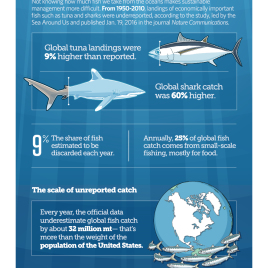
Underestimating global fisheries catches
Researchers have been substantially underestimating the total global fisheries’ catches by as much as 50 per cent, according to a new study. The results are based on “catch-reconstruction”, using scientific literature and asking local experts to help provide missing data. The researchers found increases in catches every year from 1950 to 1996, at which […]
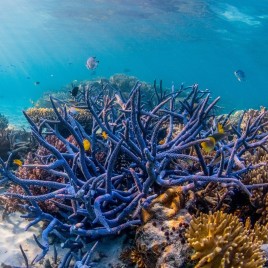
Marine protected areas failing to protect history
Marine protected areas (MPAs) are failing to protect the evolutionary diversity of fish and corals, according to a new study. The researchers conclude that over 7,000 million years of the evolutionary history of corals and 3,586 million years of fish evolution is not protected. Researchers studied 450 species of fish, which represent important components of marine biodiversity, and hundreds of species of coral, and calculated how […]
Failing our fish: Most at-risk fish species less likely to be listed
The more at risk a marine fish is in Canada, the less likely it is to be listed on the Species At Risk Act according to new research. According to Susanna Fuller, co-author and Marine Program Coordinator at the Ecology Action Centre in Halifax, “less than 20% of at-risk marine fishes in Canada have been […]

The British navy went far for food
Looking at old cod found in the hold of the Tudor warship the Mary Rose is providing a glimpse of fisheries history. A DNA analysis of the stored cod revealed it was caught in near Iceland and Newfoundland and is “illuminating the role of naval provisioning in the early development of extensive sea fisheries, with […]
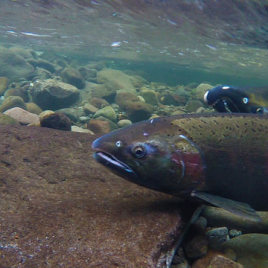
Wild salmon reproduce better than hatchery ones
Hatchery salmons are often introduced into rivers to support wild populations, which are in a state of decline. Yet hatchery males have lower reproductive success than wild ones, according to a study of 196 Coho salmons (Oncorhynchus kisutch). When occupying the same position in the spawning hierarchy, hatchery males have only 55 to 84 per […]
Wild salmon reproduce better than hatchery ones
Hatchery salmons are often introduced into rivers to support wild populations, which are in an overall state of decline, but new research suggests this may not be an effective method. A study of 196 Coho salmons (Oncorhynchus kisutch) shows hatchery males have lower reproductive success than wild ones. When occupying the same position in the […]
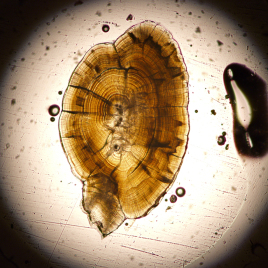
Life history of Pacific Salmon revealed through the ears
Studying small bones in the ears of Pacific Salmon may be able to tell researchers where the salmon were born and lived during critical developmental years according to new research. Studying them might allow researchers to determine which habitats produce the largest salmon populations, and where the fish live during critical periods of their life. […]
Stopping high sea fishing to increase global catch
Closing the high seas to fishing could improve the distribution of catches globally, according to a new study. Researchers estimate that around 42% of commercial fish spend their time both in high seas and coastal areas, and predict that closure of high seas will result in more of these fish being caught in coastal areas […]
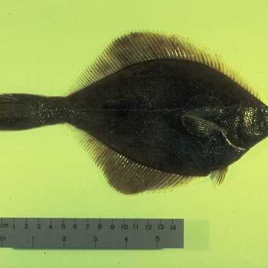
Warming oceans and melting ice mean fish will be able to move across the Arctic
Fish species living in the North Atlantic and Pacific may interchange as sea ice melts and the North West and North East passages open up. This future interchange could impact commercial fishing, as new high-latitude fisheries become more viable, and in local ecosystems as new species move in and old ones are forced out. Using […]
How to reduce damage from unregulated fisheries
Canadians are used to the idea that governments regulate fisheries, but around the world more than 100 million people – 90 per cent of the worlds’ fishers – operate in small-scale fisheries with no records or controls. In a Policy Forum article, the authors recommend methods to reduce the damage that illegal, unregulated and unreported […]
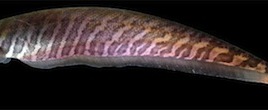
Electric knifefish signal their intentions
Electric fields emitted by knifefish can be used to predict their movements a few seconds before they occur, making these creatures an ideal model organism to study voluntary decision-making. Electric knifefish are nocturnal and live in very murky water, so they feel their way by sensing distortions in an electric field that they emit using […]
